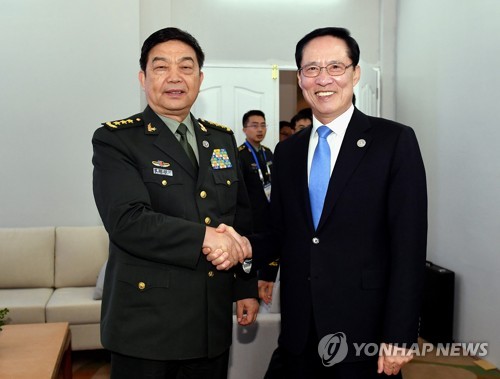As President Xi Jinping rose to China's most powerful leader in decades, South Korean companies are hoping for an improved business environment amid difficult times brought on by the deployment of a U.S. anti-missile system here, industry sources said Saturday.
During the weeklong 19th National Congress of the Communist Party of China (CPC), which wrapped up Tuesday, Xi cemented his power upon entering his second five-year term and declared a "new era" under his leadership.
Among those closely watching what ramifications the latest event could have on the strained ties between the two countries are South Korean firms, especially those in the tourism and retail sectors.

Ever since Seoul announced the deployment of the U.S. Terminal High Altitude Area Defense (THAAD) system on its soil last year, China has voiced opposition and demanded the reversal of the decision, saying it will hurt its own security interest.
Beijing has taken what appears to be retaliatory steps against South Korean companies in various areas, including a ban on selling package tours bound to the neighboring country since mid-March.
Last month, the number of Chinese tourists in South Korea dropped 56 percent on-year, marking the seventh straight month of falling figures. Chinese nationals accounted for nearly half of all tourists who visited South Korea in 2016.
South Korea's fifth-largest conglomerate Lotte, which signed a land-swap deal with the Seoul government to host the defense system, recently decided to pull out its discount store business from the Chinese market, after 87 out of 99, or 87.9 percent, of its stores had to suspend operations since early this year.
Possibly hinting at thawing relations, a leading Chinese travel agency, Ctrip.com International, Ltd., contacted one of its South Korean partners, Lotte Hotel & Resorts, earlier this week, proposing working-level talks to review the resumption of selling Seoul-bound tours, according to the local firm.
The two countries' agreement to renew their currency swap arrangement earlier this month, and their first defense ministers' talks in two years, which took place earlier in the week, also fueled expectations.
"While we cannot expect our sales in China to improve dramatically all of a sudden, the fact that there were these subtle changes in mood means a lot," an industry source said.
Yet, some others remain cautious about hastily expressing optimism.
Though Xi emphasized cooperation and coexistence with other countries during the congress, he made it clear that China would not sit idle when its national interest was hurt, a point that experts say could cast a cloud over any outlook for a quick recovery in relations with South Korea.
"Even if China allows group tours to South Korea right now, it will take months for travel agencies to prepare the programs, get all the practical work done and actually feel the improvement," another industry source said.

